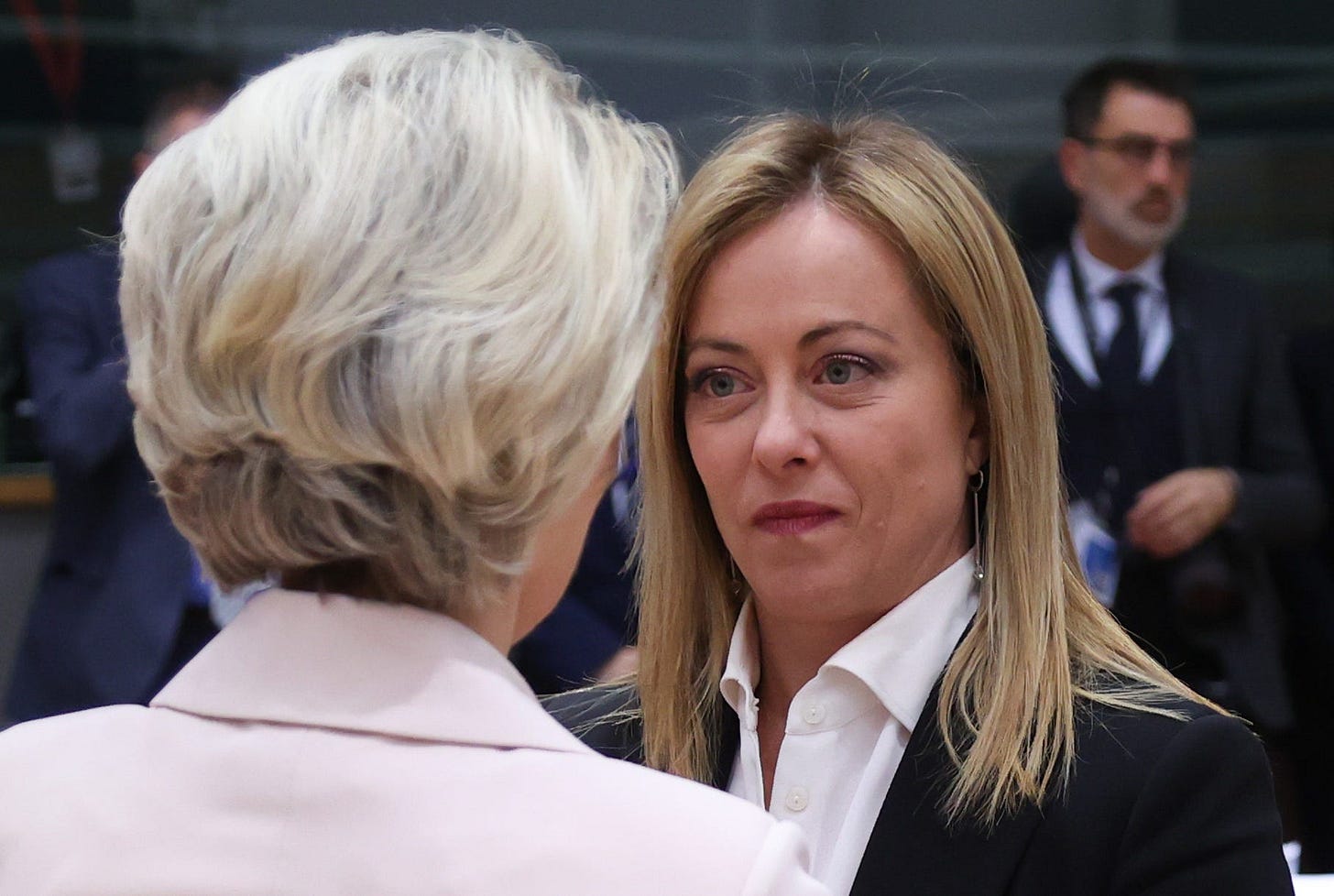Is the EU about to get a far-right vice president?
Despite their refusal to vote for her reappointment, President von der Leyen looks set to award the successor party to Mussolini's Fascists with the second-most-powerful position in the EU executive.
In the months before June’s EU election, President von der Leyen seemed very nervous. The EU Commission President was seeking a second term in the union’s top job, but she needed the approval of both national leaders in the Council and representatives in the Parliament. And according to polls, it was looking like a distinct possibility that after the election the centrists parties might not have enough seats to form a majority in the parliament, which could have left a controlling coalition of the center right and far right as the only option for securing her confirmation. And so, the EU president started very publicly courting Italy’s prime minister Giorgia Meloni. Meloni is from the far-right Brothers of Italy party, a three-steps-removed successor to Mussolini’s Fascists.
According to rumors, von der Leyen’s courtship of Meloni went even deeper behind the scenes than it did in public. It is widely believed von der Leyen promised Meloni that she would give the Italian commissioner an Executive Vice President position in the Commission (a role first held by center-left Dutch politician Frans Timmermans as “First Vice President” during the Juncker Commission) in exchange for Meloni’s support in the event of her European Conservatives and Reformists (ECR) becoming kingmaker after the election. It was expected at the time that Meloni would nominate someone from Berlusconi’s center-right Forza Italia party, the junior coalition partner in her government which also includes the far-right Lega party. That person was expected to be former Italian commissioner Antonio Tajani.
But three things changed since then. First, the far right (particularly Meloni’s ECR) ended up doing far worse than expected in June’s EU election (except in France and Germany). The far right ended up splitting into three different groups with little influence. The center held, and von der Leyen had enough votes from the three centrist groups to be easily confirmed in July. Second, Meloni refused to support von der Leyen’s re-appointment during the vote in the European Council in June, and the MEPs in her Brothers of Italy publicly said they did not vote for her in the parliament confirmation vote in July. And third, instead of someone from the center right, Meloni ended up nominating someone from her own far-right Brothers of Italy party to be commissioner - Raffaele Fitto.
So, it would seem that whatever deal von der Leyen may have struck with Meloni is off the table, right? Well, apparently not. As the Brussels bubble waits an interminably (and unprecedentedly) long time for the Commission President to announce the positions she is assigning to the 26 commissioners nominated by EU member state governments, rumors are swirling that she is going to give Fitto the Executive Vice President position and put him in charge of the EU’s economy. The center left is furious, and is threatening to vote against her entire college of commissioners in December if she goes ahead with this rumored plan. That would send all the national governments back to the drawing board to come up with new nominees, and could even mean the Council has to pick a new president nominee instead of von der Leyen (despite the vote in July, she remains only the president-elect until the second confirmation vote of her entire college later this year).
The center-left Socialists & Democrats, liberal Renew Europe, Greens, and far-left GUE groups have all made noises about refusing to back a college that has Fitto as EVP. Von der Leyen’s center-right EPP group has, in turn, seemed to be coming to Meloni’s defence. Group leader Manfred Weber told Italian media that Fitto is “a friend” and “Italy has to be well represented in the next European Commission”. Meanwhile the other two far-right groups, Le Pen and Orban’s Patriots for Europe and AfD’s Europe of Sovereign Nations, have indicated that they feel so strongly about Fitto getting an appointment they would take the unprecedented step of voting for von der Leyen’s college (they’ve never voted for a college before) to counteract rejections from the left. “No matter who Meloni proposes, he can count on the support of Vox,” Spanish MEP Jorge Buxadé, from Patriots’ member Vox, told Politico. “We do not fail our friends.”
Fitto himself is not from the extreme right wing of Brothers of Italy, he is actually considered fairly moderate by the standards of the Italian right. The unassuming politician, who has the appearance of a bureaucrat, began his career in the 1990s as part of the Berlusconi center right. He rose to political fame when he defected to join the far right. And since doing so, he has never disavowed the more extreme convictions of his party, past or present.
For many in the center and the left, however, Fitto’s competence and even his own political ideals are not the issue here. The very idea that von der Leyen would reward the far right with a major EU position, even if the person concerned doesn’t have particularly extremist views, would set a major precedent for where her second term is going to go. If Meloni can thumb her nose at the EU president - publicly spurning her in the nomination vote and then having her MEPs trash her in the confirmation vote - but then still be rewarded with a major position, it would indicate that she and her far-right movement have enormous power within the EU at this moment. Why that should be the case, when the far right did poorer than expected in June’s election, is not clear. Is the far right growing based on votes, or is it actually growing because of the power centrist politicians keep ceding to it?



